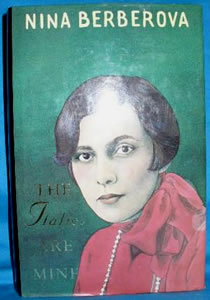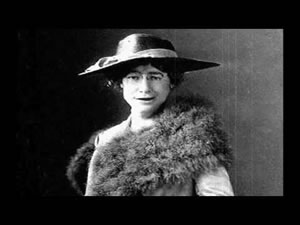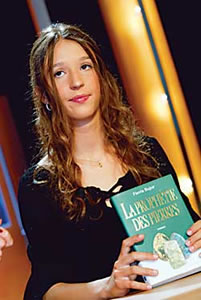|
De Japanse schrijfster Hitomi Kanehara werd geboren op 8 augustus 1983 in Tokyo. Zie ook mijn blog van 8 augustus 2007 en ook mijn blog van 8 augustus 2009.xml:namespace prefix = o ns = "urn:schemas-microsoft-com:office:office" />
Uit: Snakes and Earrings
Know what a forked tongue is?
One thatís split in two?
Yeah, like the tongue of a snake or lizard. Except sometimes ... they donít belong to a snake, and they donít belong to a lizard.
He deliberately removed the cigarette from his lips and stuck out his tongue. Its tip was clearly split in two, just like that of a snake. Then I watched, transfixed, as he lifted the right tip of it, then skillfully grasped his cigarette in the crux of the ìV.
Whoa ...
This was my first encounter with a forked tongue.
Why donít you give it a try too?î he said.
And without thought, by instinct alone, I nodded.
Getting a forked tongue is normally something done by crazy people. They call it ìbody modification. But that didnít stop me from listening intently as he explained how it was done. Apparently, you begin by getting your tongue pierced. You then gradually enlarge the hole by inserting bigger and bigger tongue rings. Then, when the hole has been stretched to a certain size, you tie dental floss or fishing line in tight loops running from the hole down the middle of the tongue. Finally, you cut the remaining part of the tongue thatís still connected using either a scalpel or a razor blade. In fact, some people donít even bother going through the whole pierce-and-tie process at allóthey just slice their tongue in two with a scalpel.
But is it safe? I mean, donít people normally die when they bite their tongue off? I asked.
It ís safe. You cauterize the tongue to stop the bleeding. Anyway, thatís just the quick method. Personally, I started with a tongue ring. It takes time, thatís true, but itís worth it for a cleaner cut.
The idea of a cauterizing iron pressed against a bloody tongue made my skin crawl, though Iím no stranger to body modification of a kind.

Hitomi Kanehara (Tokyo, 8 augustus 1983)
De Russische schrijfster Nina Nikolaevna Berberova werd geboren op 8 augustus 1901 in Sint Petersburg. Zie ook mijn blog van 8 augustus 2007 en ook mijn blog van 8 augustus 2009.
Uit: The Little Stranger (Vertaald door Marian Schwartz)
She walked up to one of the women who was rocking an infant, shifting him from arm to arm. She had just nursed him, and her breast was bared. The infant had been born about a week before and had probably still not been registered at the Billancourt City Hall. Anastasia heard the woman croon:
Tri-ta-taski tri-ta-tish
First on that one, then on this.
Anastasia Georgievna looked at the breast that had been dragged all across Europe and felt something warm fill her eyes and even spill over her eyelids and run down her cheek, something people might notice. She went to the bistro owners, took out a little of the money she kept in her traveling bag, and asked them to put a piece of meat in each cup of bouillon.
(...)
Anastasia Georgievna turned white, then gray, and barely reached her chair. At first she was pierced by a kind of joy, but then a horrible unease engulfed her: Not for this had she inured herself to her ferocious loneliness all these years, not for this had she reconciled herself to the idea of dying with unclosed eyes, not so that now, suddenly, everything would be violated and her memories of her life as a young thing and her habits as a dying woman would go up in smoke.

Nina Berberova (8 augustus 1901 26 september 1993)
De Amerikaanse dichteres Sara Teasdale werd geboren op 8 augustus 1884 in St. Louis. Zie ook mijn blog van 8 augustus 2007 en ook mijn blog van 8 augustus 2008 en ook mijn blog van 8 augustus 2009.
Alone
I am alone, in spite of love,
In spite of all I take and give
In spite of all your tenderness,
Sometimes I am not glad to live.
I am alone, as though I stood
On the highest peak of the tired gray world,
About me only swirling snow,
Above me, endless space unfurled;
With earth hidden and heaven hidden,
And only my own spirit's pride
To keep me from the peace of those
Who are not lonely, having died.
I Thought Of You
I thought of you and how you love this beauty,
And walking up the long beach all alone
I heard the waves breaking in measured thunder
As you and I once heard their monotone.
Around me were the echoing dunes, beyond me
The cold and sparkling silver of the sea --
We two will pass through death and ages lengthen
Before you hear that sound again with me.
Did You Never Know?
Did you never know, long ago, how much you loved me
That your love would never lessen and never go?
You were young then, proud and fresh-hearted,
You were too young to know.
Fate is a wind, and red leaves fly before it
Far apart, far away in the gusty time of year
Seldom we meet now, but when I hear you speaking,
I know your secret, my dear, my dear.

Sara Teasdale (8 augustus 1884 29 januari 1933)
De Franse schrijfster Flavia Bujor werd geboren op 8 augustus 1988 in Roemenië. Zie ook mijn blog van 8 augustus 2007.
Uit: The Prophecy of the Stones
THE OLD MAN READ THE PASSAGE IN THE PROPHECY once more and nodded solemnly. "Soon, very soon," he muttered. Rising with difficulty from his chair, he turned to face the Duke of Divulyon, who was waiting anxiously before him.
"Well?" asked the duke.
The old man sighed deeply. He seemed exhausted. His face was etched with countless wrinkles. His back was bent, and he could barely stand on his trembling legs. Collapsing into an armchair, he said weakly, "I cannot change a thing. She will follow her destiny."
"Théodon, you are a wise man," said the duke, his voice rising in obvious distress. "You have devoted your entire life to understanding the Prophecy. You helped my father. You have helped me. You have advised me, supported me. Do not abandon me now! She must live. She must triumph, whatever happens. She is so young! To think that soon . . . What can I do to protect her, Théodon?"
Holding his head in his hands, the old man remained silent for a long time.
"I love her as much as you do," he replied at last. "I watched her grow up, and even though it goes against my better judgment, I have become fond of her. But she will not escape the Prophecy. Believe me, if I could have helped her, I would have been the first to do so. You ask me how she can be protected? You cannot protect her! Try to understand that! All you have to do is give her what is rightfully hers when the day comes. Now, go. Go and spend the few moments you have left with her."

Flavia Bujor (Roemenië, 8 augustus 1988)
|



